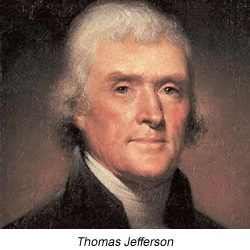
The Independent Voice for Conservative Values and the Conscience of the Conservative Movement Less Government is the Best Government |
||||
Thomas Jefferson – Life, Liberty, and… the Divisive Issue of Slavery
-by Scott Rohter, January 2012
“The sacred rights of mankind are not to be found among old parchments or musty records. They are written as with a beam of light in the whole volume of human history by the hand of God, and they can never be erased or obscured by mere mortal power.” -Alexander Hamilton, reprisal
~
 The fundamental rights, upon which our English common law is based, are the right to Life, Liberty, and Property. They have never been more eloquently stated than by the English philosopher, John Locke (1632-1704) whose ideas became the foundation for the Whig Party. Their motto was “Life, Liberty, and Property.” Later, his ideas were the fountainhead from which Thomas Jefferson drew on to write our American Declaration of Independence. However property rights were not even mentioned in the Declaration of Independence, or in the United States Constitution as it was originally signed and ratified. Property rights were not mentioned as one of the truths that our Founding Fathers held to be self-evident, or one of the unalienable rights with which we are all endowed by our Creator.
The fundamental rights, upon which our English common law is based, are the right to Life, Liberty, and Property. They have never been more eloquently stated than by the English philosopher, John Locke (1632-1704) whose ideas became the foundation for the Whig Party. Their motto was “Life, Liberty, and Property.” Later, his ideas were the fountainhead from which Thomas Jefferson drew on to write our American Declaration of Independence. However property rights were not even mentioned in the Declaration of Independence, or in the United States Constitution as it was originally signed and ratified. Property rights were not mentioned as one of the truths that our Founding Fathers held to be self-evident, or one of the unalienable rights with which we are all endowed by our Creator.
Why not? A clue to this puzzle might be found in Article 1, Section 2, Clause 3 of the U.S. Constitution, where it states that, “Representation and direct taxes shall be apportioned among the several States… according to their representative numbers which shall be determined by adding to the whole number of free persons, including those bound to service for a term of years, and excluding Indians not taxed, three-fifths of all other persons.” Those other persons referred to here were African slaves, who were still considered to be the private property of their Southern masters who ‘owned’ them. Primarily located in six Southern States: Virginia, Maryland, North Carolina, South Carolina, Georgia, and Delaware, the Southern plantation owners would have never agreed to sign the Constitution, or enter into any Union that threatened their ‘property rights’. On the other hand, the seven Northern States of New York, New Jersey, New Hampshire, Massachusetts, Pennsylvania, Connecticut, and Rohde Island, did not want to give any pretext or legal basis for prolonging what they considered to be the unconscionable sin of slavery. Most Northerners felt that the whole idea of ‘owning’ another person was wrong!
It is likely that the U.S. Constitution and the Declaration of Independence purposely side-stepped this divisive issue of slavery, and did not mention property rights, so as not to step into that fray or appear to take sides, or provide any legal basis for the institution of slavery, which many of the signatories considered to be morally wrong. The Northern States did not want to sign a document that appeared to be defending any concept of private property rights that included the practice of owning other people. And the Southern States wouldn’t have signed the Constitution if it had specifically outlawed slavery! So instead of restating the simple words of the philosopher John Locke and the Whig Party, that Life, Liberty, and Property are among those unalienable rights with which we are endowed by our Creator, the Declaration of Independence substituted the less contentious, and at the time more politically correct phrase of Life, Liberty, and the Pursuit of Happiness. Thus, the drafters of the Declaration of Independence, who were primarily Thomas Jefferson, John Adams, and Benjamin Franklin avoided the politically and morally indefensible position of appearing to give Southern States a legal basis for prolonging and extending the institution of slavery, while at the same time providing a way for them to sign the document.
Later, after the Constitution had been ratified by the legislatures of nine of the original thirteen colonies, and after the United States had officially been declared a sovereign nation, one of the very first acts of Congress was to pass the first ten Amendments to the United States Constitution, called the Bill of Rights. In the First Amendment to the Constitution there is what is called the Non-Establishment Clause. It probably owes much of its inspiration to the great English poet and political thinker, John Milton (1608-1674). He was a contemporary of John Locke (although he was about 24 years older). When the Bill of Rights was passed, the difficult issue of Property Rights was also addressed in the Fourth and Fifth Amendments, but only after the Constitution had already been signed and ratified, and the new nation was safely on its way.
In the Fifth Amendment to the U.S. Constitution we read, “[No person shall] be deprived of Life, Liberty, or Property without due process of law, nor shall private property be taken for public use without just compensation.” This idea is directly attributed to John Locke, however it did not originate with the great English philosopher of the 17th century. It can be traced farther back to Roman and Greek law, and even farther back to the Mosaic law of the Bible! The phrases without due process of law and without just compensation obviously satisfied Southern slaveholders, because after all, the Bill of Rights was passed by Congress and signed by President George Washington, who also happened to own slaves. Nevertheless, it is clear that our Founding Fathers were rather deftly trying to walk a fine line, by trying to steer our young nation around the divisive issue of slavery.
"The truth, the political truth, and nothing but the political truth. A journalist has no better friend than the truth." - Scott Rohter |
 |
© Scott Rohter, Less Gov is the Best Gov .com. All rights reserved.